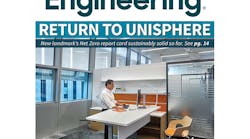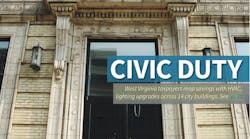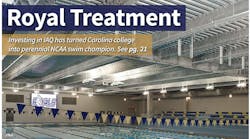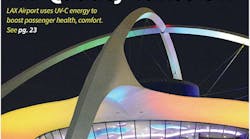The total building-sustainability package, addressing everything from design and commissioning to plans for high-performance operation, is covered in a proposed green-building standard currently open for public review.
Proposed Standard 189.1, Standard for the Design of High Performance, Green Buildings Except Low-Rise Residential Buildings, is being developed by the American Society of Heating, Refrigerating and Air-Conditioning Engineers (ASHRAE) in conjunction with the Illuminating Engineering Society (IES) and the U.S. Green Building Council (USGBC). The standard is slated to be the first code-intended commercial-green-building standard in the United States. It is expected to be published in early 2010.
“This is one of the most highly-anticipated building standards ever released,” ASHRAE President Gordon Holness said. “ASHRAE’s commitment to excellence and transparency in true consensus standards development is reflected in the quality of and interest in Standard 189.1.”
The proposed standard currently is open for a fourth public review. It is an “independent substantive change” review, so only changes from the third public review, which ended in June 2009, are open for comment. The public comment period started Sept. 18 and will remain open until Nov. 2.
“IES is pleased to co-sponsor this standard for high-performance green buildings and supports the goal shared with ASHRAE and USGBC of environmental responsibility toward current needs as well as those of future generations,” Rita M. Harrold, IES director of technology, said.
“The key to a prosperous future is cost-efficient and energy-saving green buildings and is imperative as we move forward,” Scot Horst, senior vice president of LEED for the USGBC, said. “Standard 189.1 will help increase adoption of green-building practices, leading to a prosperous and sustainable future for our nation.”
“The standard, once published, provides a ‘total building-sustainability package’ for those who strive to design, build, and operate green buildings,” Kent Peterson, chair of the committee writing the standard, said. “From site location to energy use to recycling, this standard will set the foundation for green buildings through its adoption into local codes. The dedication of those tasked with writing the standard has been unwavering. There are no short cuts to creating a quality, comprehensive green-building standard that reflects input from all corners of the building community.”
Among the biggest proposed changes is in the exterior-light-pollution section, including elimination of the Total Site Lumen approach. The draft of the standard that went out for a third public review earlier this year required users to limit exterior lighting according to one of three methods for determining total initial lamp lumens, or light output, for all outdoor lighting. While site lumen limits are being explored in other model lighting-pollution efforts, it complicates application and enforcement significantly, according to Nick Ferzacca, vice chair of the committee and IES representative. The current draft maintains the use of Backlight, Uplight, and Glare ratings from the IES Luminaire Classification System for Outdoor Luminaires (IESNA TM-15-07). Also, exterior-lighting power densities and lighting-zone definitions were modified to align with recent ANSI/ASHRAE/IESNA Standard 90.1, Energy Standard for Buildings Except Low Rise Residential Buildings, addenda.
Another proposed change is in the Outdoor Air Delivery Monitoring section. Under the proposal, measurement of outdoor-airflow rates at the system level would be required for all spaces ventilated by mechanical systems, except for constant volume systems. The exception allowing carbon-dioxide monitoring as an alternative for systems serving only densely occupied spaces has been removed. Also proposed would be removal of all requirements for outdoor airflow monitoring in naturally ventilated spaces.
The standard development committee will meet again to review comments received during this “independent substantive change” public review during the USGBC GreenBuild conference in November.
To view a copy of the public review draft, go to www.ashrae.org/publicreviews. Copies of public review drafts are only available during public review periods.
Latest from Archive
Latest from Archive
Read the October 2020 - Digital Edition
Oct. 2, 2020
Read the March 2020 - Digital Edition
March 2, 2020
Read the September 2019 - Digital Edition
Sept. 1, 2019
Read the August 2019 - Digital Edition
Aug. 1, 2019
Read the July 2019 - Digital Edition
July 8, 2019
Read the May 2019 - Digital Edition
May 2, 2019
Read the April 2019 - Digital Edition
April 2, 2019
Read the March 2019 - Digital Edition
March 6, 2019








